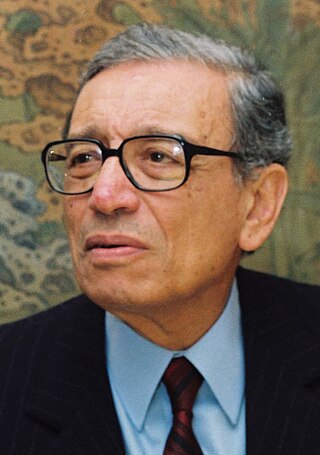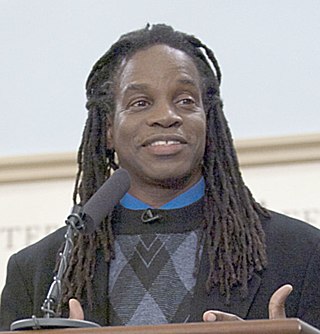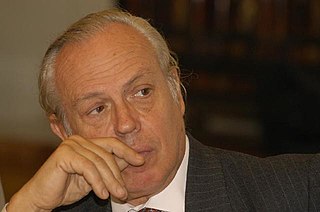
Kofi Atta Annan was a Ghanaian diplomat who served as the seventh secretary-general of the United Nations from 1997 to 2006. Annan and the UN were the co-recipients of the 2001 Nobel Peace Prize. He was the founder and chairman of the Kofi Annan Foundation, as well as chairman of The Elders, an international organisation founded by Nelson Mandela.

The United Nations (UN) is an intergovernmental organization that aims to maintain international peace and security, develop friendly relations among nations and countries, achieve international cooperation, and serve as a centre for coordinating the actions of member states. It is widely recognized as the world's largest international organization. The UN is headquartered in New York City, in international territory with certain privileges extraterritorial to the United States, and the UN has other offices in Geneva, Nairobi, Vienna, and The Hague, where the International Court of Justice is headquartered at the Peace Palace.

The Organisation internationale de la Francophonie is an international organization representing where there is a notable affiliation with French language and culture. It is also called the French Commonwealth.

Boutros Boutros-Ghali was an Egyptian politician and diplomat who served as the sixth Secretary-General of the United Nations from 1992 to 1996. Prior to his appointment as secretary-general, Boutros-Ghali was the acting Minister of Foreign Affairs of Egypt between 1977 and 1979. He oversaw the United Nations over a period coinciding with several world crises, including the breakup of Yugoslavia and the Rwandan genocide.

Turkmenistan's human rights record has been heavily criticized by various countries and scholars worldwide. Standards in education and health declined markedly during the rule of President Saparmurat Niyazov.
Since the late 1990s there have been many calls for reforms of the United Nations (UN). However, there is little clarity or consensus about what reform might mean in practice. Both those who want the UN to play a greater role in world affairs and those who want its role confined to humanitarian work or otherwise reduced use the term "UN reform" to refer to their ideas. The range of opinion extends from those who want to eliminate the UN entirely, to those who want to make it into a full-fledged world government. Secretaries-General have presented numerous ways to implement these new reforms. There have been reform efforts since the creation of the UN and closely associated with each of the Secretaries-General.

Federico Mayor Zaragoza was a Spanish scientist, scholar, politician, diplomat and poet. He served as the director-general of the United Nations Educational, Scientific, and Cultural Organization (UNESCO) from 1987 to 1999. After his tenure as director-general, he continued to participate in various peace-related organizations, such as the Foundation for a Culture of Peace and the International Decade for the Promotion of a Culture of Peace and Non-Violence for the Children of the World, as a member of their honorary boards. Additionally, he served as the honorary chairman of the Académie de la Paix.

Salim Ahmed Salim is a Tanzanian politician and diplomat who has worked in the international diplomatic arena since the early 1960s. He served as prime minister for one year, from 1984 to 1985.

Inter Press Service (IPS) is a global news agency headquartered in Rome, Italy. Its main focus is news and analysis about social, political, civil, and economic subjects as they relate to the Global South, civil society, and globalization.
Human rights in the Philippines are protected by the Constitution of the Philippines, to make sure that people in the Philippines are able to live peacefully and with dignity, safe from the abuse of any individuals or institutions, including the state.
United Nations Radio was created on 13 February 1946. In 2017, United Nations Radio and the UN News Centre merged to form UN News, producing daily news and multimedia content in Arabic, Chinese, English, French, Swahili, Portuguese, Russian, Spanish, and Hindi. In its new iteration, UN News Audio continues to produce daily news and feature stories about the work of the UN and its member countries in eight languages for more than 2,000 partner radio stations around the world.
Journalists for Human Rights (JHR) is Canada's largest international media development organization. Based in Toronto, Ontario, Canada, JHR was founded in 2002 by Benjamin Peterson and Alexandra Sicotte-Levesque in 2002. JHR's mission is to inspire and mobilize media to cover human rights stories in ways that help communities help themselves. The organization's vision is for everyone in the world to access their human rights.

Stephan Mögle-Stadel is a German educator, journalist and book writer.
Media Defence is a non-governmental organization established in 2008 to provide legal assistance to journalists, citizen journalists and independent media institutions. It also supports training in media law and promotes the exchange of information, litigation tools and strategies for lawyers working on media freedom cases. It is based in London, England and has a global network of media lawyers and media freedom activists with whom it works on cases and projects.

Clarence Lusane is an American author, activist, lecturer and freelance journalist. His most recent major work is his book The Black History of the White House.
IIDA Women's Development Organisation (IIDA) is a non-governmental organisation founded in Mogadishu, Somalia by a group of Somali women leaders to provide relief and emergency services to women and children affected by the civil war in Somalia. Over the years, IIDA has evolved to focus on policy development and strengthening accountability of government institutions. The organisation advocates for the rights of vulnerable children, youth, and women; and promotes peace among communities.

Roberto Savio is a journalist, communication expert, political commentator, activist for social and climate justice and advocate of global governance. He has spent most of his career with Inter Press Service (IPS), the news agency which he founded in 1964 along with Argentine journalist Pablo Piacentini.
Euro-Mediterranean Human Rights Monitor is an independent, nonprofit organization for the protection of human rights.

Safety of journalists is the ability of journalists and media professionals to receive, produce and share information without facing physical or moral threats.

Women in media are individuals who participate in media. Media are the collective communication outlets or tools used to store and deliver information or data. The role of women in media revolves around the four axes of media: media freedom, media pluralism, media independence, and media safety.













